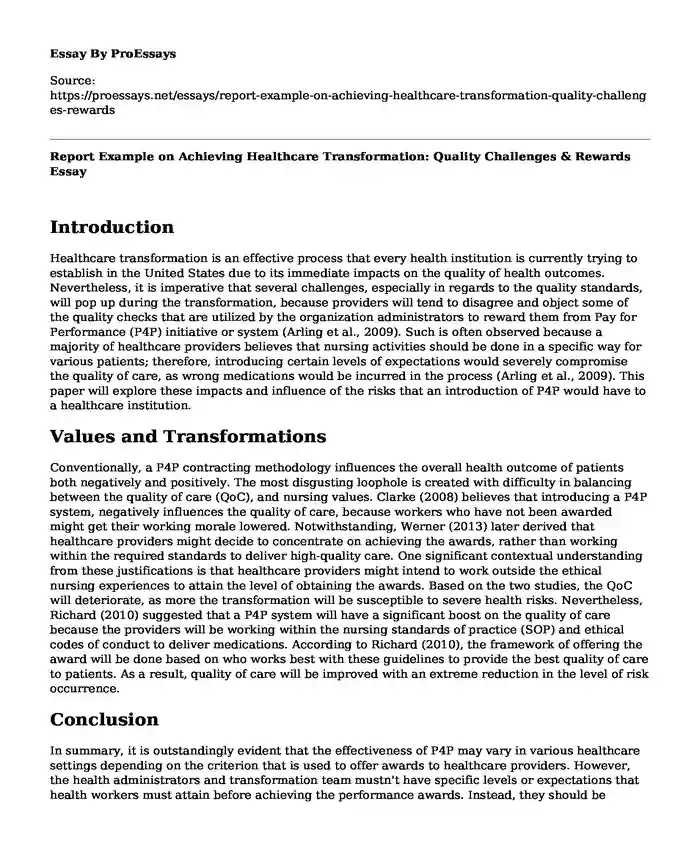Introduction
Healthcare transformation is an effective process that every health institution is currently trying to establish in the United States due to its immediate impacts on the quality of health outcomes. Nevertheless, it is imperative that several challenges, especially in regards to the quality standards, will pop up during the transformation, because providers will tend to disagree and object some of the quality checks that are utilized by the organization administrators to reward them from Pay for Performance (P4P) initiative or system (Arling et al., 2009). Such is often observed because a majority of healthcare providers believes that nursing activities should be done in a specific way for various patients; therefore, introducing certain levels of expectations would severely compromise the quality of care, as wrong medications would be incurred in the process (Arling et al., 2009). This paper will explore these impacts and influence of the risks that an introduction of P4P would have to a healthcare institution.
Values and Transformations
Conventionally, a P4P contracting methodology influences the overall health outcome of patients both negatively and positively. The most disgusting loophole is created with difficulty in balancing between the quality of care (QoC), and nursing values. Clarke (2008) believes that introducing a P4P system, negatively influences the quality of care, because workers who have not been awarded might get their working morale lowered. Notwithstanding, Werner (2013) later derived that healthcare providers might decide to concentrate on achieving the awards, rather than working within the required standards to deliver high-quality care. One significant contextual understanding from these justifications is that healthcare providers might intend to work outside the ethical nursing experiences to attain the level of obtaining the awards. Based on the two studies, the QoC will deteriorate, as more the transformation will be susceptible to severe health risks. Nevertheless, Richard (2010) suggested that a P4P system will have a significant boost on the quality of care because the providers will be working within the nursing standards of practice (SOP) and ethical codes of conduct to deliver medications. According to Richard (2010), the framework of offering the award will be done based on who works best with these guidelines to provide the best quality of care to patients. As a result, quality of care will be improved with an extreme reduction in the level of risk occurrence.
Conclusion
In summary, it is outstandingly evident that the effectiveness of P4P may vary in various healthcare settings depending on the criterion that is used to offer awards to healthcare providers. However, the health administrators and transformation team mustn't have specific levels or expectations that health workers must attain before achieving the performance awards. Instead, they should be awarded based on the additional ethical and nursing value, that one showed above others to ensure that the healthcare institution attains its mission, and objectives.
References
Arling, G., Job, C., & Cooke, V. (2009). Medicaid nursing home pay for performance: where do we stand? The Gerontologist, 49(5), 587-595.
https://academic.oup.com/gerontologist/article-abstract/49/5/587/639904
Clarke, S. P., Raphael, C., & Disch, J. (2008). Challenges and directions for nursing in the pay-for-performance movement. Policy, Politics, & Nursing Practice, 9(2), 127-134. https://journals.sagepub.com/doi/abs/10.1177/1527154408320419
Richard, M. (2010). Pay for performance (P4P) programs in health services: what is the evidence. World Health Report. Background Paper, 31.
http://digicollection.org/hss/documents/s18313en/s18313en.pdf
Werner, R. M., Konetzka, R. T., & Polsky, D. (2013). The effect of payforperformance in nursing homes: evidence from state Medicaid programs. Health services research, 48(4), 1393-1414. https://onlinelibrary.wiley.com/doi/abs/10.1111/1475-6773.12035
Cite this page
Report Example on Achieving Healthcare Transformation: Quality Challenges & Rewards. (2023, Oct 12). Retrieved from https://proessays.net/essays/report-example-on-achieving-healthcare-transformation-quality-challenges-rewards
If you are the original author of this essay and no longer wish to have it published on the ProEssays website, please click below to request its removal:
- Sugar Shacks Essay Example
- Public Health Policy Analysis on Infectious Disease Reemergence - research-paper
- Paper Example on the Amish Culture: Impact of Cultural Values on Medical Care
- Research Paper on Preventing Maternal Deaths from Postpartum Hemorrhage Worldwide
- Essay Sample on Capacity vs Vulnerability: Emergency Preparedness
- Protecting Older Adults During the Covid-19 Pandemic - Essay Sample
- Paper Example on HIV/AIDS Epidemic: Impact on American Indians







